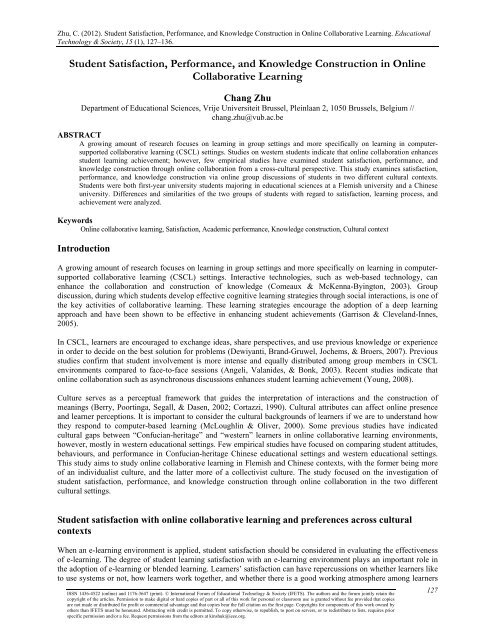January 2012 Volume 15 Number 1 - Educational Technology ...
January 2012 Volume 15 Number 1 - Educational Technology ...
January 2012 Volume 15 Number 1 - Educational Technology ...
Create successful ePaper yourself
Turn your PDF publications into a flip-book with our unique Google optimized e-Paper software.
Zhu, C. (<strong>2012</strong>). Student Satisfaction, Performance, and Knowledge Construction in Online Collaborative Learning. <strong>Educational</strong><br />
<strong>Technology</strong> & Society, <strong>15</strong> (1), 127–136.<br />
Student Satisfaction, Performance, and Knowledge Construction in Online<br />
Collaborative Learning<br />
Chang Zhu<br />
Department of <strong>Educational</strong> Sciences, Vrije Universiteit Brussel, Pleinlaan 2, 1050 Brussels, Belgium //<br />
chang.zhu@vub.ac.be<br />
ABSTRACT<br />
A growing amount of research focuses on learning in group settings and more specifically on learning in computersupported<br />
collaborative learning (CSCL) settings. Studies on western students indicate that online collaboration enhances<br />
student learning achievement; however, few empirical studies have examined student satisfaction, performance, and<br />
knowledge construction through online collaboration from a cross-cultural perspective. This study examines satisfaction,<br />
performance, and knowledge construction via online group discussions of students in two different cultural contexts.<br />
Students were both first-year university students majoring in educational sciences at a Flemish university and a Chinese<br />
university. Differences and similarities of the two groups of students with regard to satisfaction, learning process, and<br />
achievement were analyzed.<br />
Keywords<br />
Online collaborative learning, Satisfaction, Academic performance, Knowledge construction, Cultural context<br />
Introduction<br />
A growing amount of research focuses on learning in group settings and more specifically on learning in computersupported<br />
collaborative learning (CSCL) settings. Interactive technologies, such as web-based technology, can<br />
enhance the collaboration and construction of knowledge (Comeaux & McKenna-Byington, 2003). Group<br />
discussion, during which students develop effective cognitive learning strategies through social interactions, is one of<br />
the key activities of collaborative learning. These learning strategies encourage the adoption of a deep learning<br />
approach and have been shown to be effective in enhancing student achievements (Garrison & Cleveland-Innes,<br />
2005).<br />
In CSCL, learners are encouraged to exchange ideas, share perspectives, and use previous knowledge or experience<br />
in order to decide on the best solution for problems (Dewiyanti, Brand-Gruwel, Jochems, & Broers, 2007). Previous<br />
studies confirm that student involvement is more intense and equally distributed among group members in CSCL<br />
environments compared to face-to-face sessions (Angeli, Valanides, & Bonk, 2003). Recent studies indicate that<br />
online collaboration such as asynchronous discussions enhances student learning achievement (Young, 2008).<br />
Culture serves as a perceptual framework that guides the interpretation of interactions and the construction of<br />
meanings (Berry, Poortinga, Segall, & Dasen, 2002; Cortazzi, 1990). Cultural attributes can affect online presence<br />
and learner perceptions. It is important to consider the cultural backgrounds of learners if we are to understand how<br />
they respond to computer-based learning (McLoughlin & Oliver, 2000). Some previous studies have indicated<br />
cultural gaps between “Confucian-heritage” and “western” learners in online collaborative learning environments,<br />
however, mostly in western educational settings. Few empirical studies have focused on comparing student attitudes,<br />
behaviours, and performance in Confucian-heritage Chinese educational settings and western educational settings.<br />
This study aims to study online collaborative learning in Flemish and Chinese contexts, with the former being more<br />
of an individualist culture, and the latter more of a collectivist culture. The study focused on the investigation of<br />
student satisfaction, performance, and knowledge construction through online collaboration in the two different<br />
cultural settings.<br />
Student satisfaction with online collaborative learning and preferences across cultural<br />
contexts<br />
When an e-learning environment is applied, student satisfaction should be considered in evaluating the effectiveness<br />
of e-learning. The degree of student learning satisfaction with an e-learning environment plays an important role in<br />
the adoption of e-learning or blended learning. Learners’ satisfaction can have repercussions on whether learners like<br />
to use systems or not, how learners work together, and whether there is a good working atmosphere among learners<br />
ISSN 1436-4522 (online) and 1176-3647 (print). © International Forum of <strong>Educational</strong> <strong>Technology</strong> & Society (IFETS). The authors and the forum jointly retain the<br />
copyright of the articles. Permission to make digital or hard copies of part or all of this work for personal or classroom use is granted without fee provided that copies<br />
are not made or distributed for profit or commercial advantage and that copies bear the full citation on the first page. Copyrights for components of this work owned by<br />
others than IFETS must be honoured. Abstracting with credit is permitted. To copy otherwise, to republish, to post on servers, or to redistribute to lists, requires prior<br />
specific permission and/or a fee. Request permissions from the editors at kinshuk@ieee.org.<br />
127

















